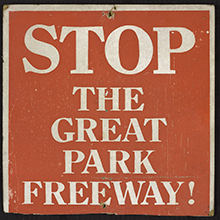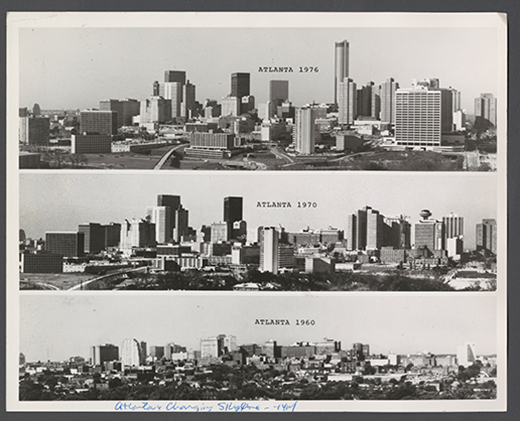The city of Atlanta experienced rapid growth during the second half of the 20th century. A new exhibition now on view at Robert W. Woodruff Library, called "Changing Atlanta 1950-1999: The Challenges of a Growing Southern Metropolis," illustrates how city leaders and citizens met those challenges.
A panel discussion with curators on April 12 will give the public more insight into this exciting time by examining the political, economic, geographic and cultural shifts brought on as Atlanta grew into a metropolis. The discussion will be held at 6:30 p.m. on in the Jones Room at the Woodruff Library.
The exhibition highlights four collections from the Stuart A. Rose Manuscript, Archives, and Rare Book Library:
- the Randolph Thrower papers,
- the Druid Hills Civic Association records,
- the Community Council of the Atlanta Area records, and
- the John Sibley papers.
Some of the featured photographs are from the Atlanta Daily World and Ron Sherman photograph collections.
Curated by Erica Bruchko, W. Michael Camp, Louis Fagnan, Kristin Morgan and Laura Starratt, the exhibition will illuminate how citizens confronted the trials of a rapidly evolving metropolis. It will focus on four areas:
- The end of the county-unit political system in Georgia and the revitalization of the state Republican Party;
- How Georgia responded to the federal mandate to integrate the public schools;
- The effect of advocacy in social planning; and
- The involvement of neighborhood associations.
"Many of the topics that we address in this exhibition are ones that are still being discussed in Atlanta," says Starratt, who is also a manuscript archivist in the Rose Library. "These issues include the rise of charter and private schools; Atlanta's growth as the political powerhouse in Georgia; various social movements and advocacy for communities; and Atlanta's progressive nature versus its own historic designations."

Louis Fagnan, a graduate student and assistant in the Woodruff Library, will speak about Atlanta lawyer Randolph Thrower and his work in ending the county-unit system in Georgia, which sparked a revitalization of the state Republican Party. Michael Camp will address how traditional neighborhoods responded to the rapid physical growth of the city (Druid Hills was often targeted for highway development, which mobilized residents to block such initiatives). Kristin Morgan, an assistant in the Rose Library, will discuss her work in archives and the work of the Community Council of the Atlanta Area, a Midtown-based organization that sought to influence welfare and human services legislation to improve the lives of the city's most vulnerable residents.
Joseph Crespino, chair of the Emory University history department, will offer opening remarks. Atlanta historian Ed Hatfield, a former Emory Center for Digital Scholarship graduate fellow in digital humanities and a history instructor at Kennesaw State University, will be the moderator.
The exhibition will be on view until June 19 in the Schatten Gallery on Level 3 of the Woodruff Library.

